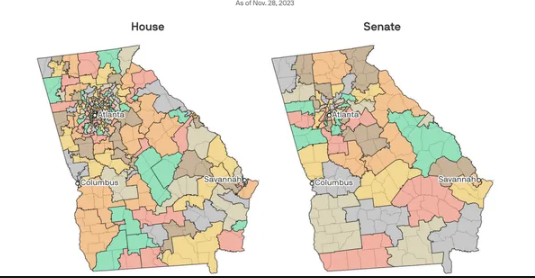
Georgia Legislature Approves New Congressional Maps Amid Partisan Tensions
In a significant political development, the Georgia House of Representatives has concluded its special session with the approval of revised congressional district maps. The passage of Senate Bill 3EX, by a vote of 98-71, reflects the ongoing partisan tensions within the state. The Senate had previously passed the bill, setting the stage for the House’s decision. This legislative move now places the bill on the desk of Governor Brian Kemp, a Republican, for his anticipated signature.
The adoption of these new district maps is pivotal in Georgia’s political landscape. Analysts predict that the revised boundaries will preserve the existing 9-5 Republican majority in the U.S. House of Representatives. This redistricting was compelled by a directive from the federal court, which found that the prior maps contravened the Voting Rights Act of 1965. The court specifically pointed out that the earlier maps weakened the voting power of African American communities in Georgia.
Patriots Alert !!!
The debate over these new maps has been marked by divergent views. State Representative Matt Reeves, a Republican from Duluth, has been vocal in his support for the redrawn districts. He insists that the new maps are not only equitable but also in full compliance with the federal court’s mandate, aiming to ensure fair representation for all Georgians.
In stark contrast, the Democratic Party of Georgia has raised serious concerns about the new maps. Democratic officials argue that the redrawn boundaries represent an ongoing effort to engage in racial gerrymandering. They assert that the new maps are designed to diminish the political voice and influence of Black voters in the state, undermining the principles of fair representation.
Despite these allegations, Republican legislators stand firm on their position. State Representative Rob Leverett, a Republican from Elberton, has stressed the GOP’s dedication to adhering to the federal court’s guidelines. Leverett’s statements reflect a broader Republican sentiment that the new districting process was conducted with utmost regard for legal compliance and fairness.
This development in the House comes on the heels of other significant legislative actions. Earlier in the week, the Georgia legislature passed revised maps for both the Senate and the House districts. These maps, too, have been forwarded to Governor Kemp for his approval, marking a comprehensive overhaul of Georgia’s political districts ahead of upcoming electoral cycles.
As Georgia navigates these complex political and legal challenges, the approval of the new congressional maps signals a critical juncture in the state’s efforts to balance legal mandates, partisan interests, and the diverse needs of its electorate.


Average Rating